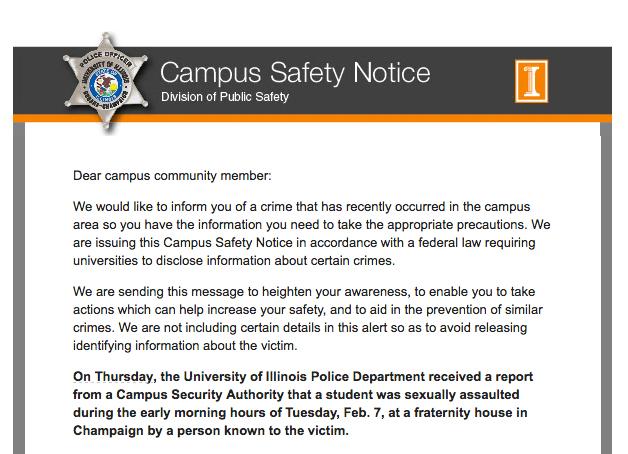UIPD isn’t protecting fraternities from sexual assault allegations
More stories from Isabella Winkler
Students received this Campus Safety Notice on February 9th regarding an alleged sexual assault.

All students at the University are probably familiar with the Campus Safety Notices. In the past couple of weeks, the police used this medium to inform the campus about two different sexual assaults occurring at fraternity houses.
On Feb. 6, the police issued a safety notice describing a sexual assault at an unknown fraternity. On Feb. 9, they issued a similar notice describing a sexual assault at a fraternity house by someone known to the survivor.
During just the first week of the last fall semester, students were informed of three different sexual assaults that were reported, two of which occurred at fraternity houses.
These reports had students wondering why the police chose not to include the names of the implicated fraternities.
Get The Daily Illini in your inbox!
Students argue that the whole campus has a right to know if a fraternity house is harboring a perpetrator or condoning these actions. Instead, it seems the anonymity guarantees their reputations remain untainted.
The outrage is understandable, but it might be surprising to know that police don’t provide anonymity to protect the fraternity. In fact, it is to protect the survivor more than anything.
An article published by The Tab Illinois expressed outrage over the perceived notion that the University purposely protects fraternities’ reputations.
“Apparently some people think by disclosing the names of the specific organizations implicated would damage their reputation,” argued Harold Zhu. “Displaying outright favoritism towards specific groups doesn’t show (equality and respect). If an organization becomes associated with sexual assault, it should re-evaluate its core beliefs.”
In a Feb. 17 post on the UIPD’s website, the department responded to these concerns from students.
“Some information — like demographic information about the survivor or exact times and locations — is withheld from the mass emails to protect the survivor’s privacy and avoid unintentionally identifying that person,” the website states.
If the police revealed specific information about the fraternity, it could put the survivor at risk. Other students could deduce who the survivor is based on people who are often associated with the fraternity. This information could also put survivors in danger of retaliation for reporting the offense.
It is absolutely disheartening that students receive these alerts so often, especially because they are regularly reporting a sexual assault. It is also frustrating that it seems as if these fraternities are getting away with it.
Many times, though, it is the survivor who chooses not to report the perpetrator or his fraternity.
Survivors may also report an assault, but choose not to have the perpetrator arrested or prosecuted, Police Chief Jeff Christensen said in the UIPD release. Going through the motions of an investigation can add to the trauma by putting pressure on survivors and forcing them to relive the assault.
The Clery Act requires that the University share certain details about crimes committed on campus. When this information is shared, it is easy for students to forget about the survivor’s’ safety in search of specifics.
“It’s important to keep in mind that sexual assault is a crime of power and control,” said Molly McLay, assistant director of the Women’s Resources Center. “When someone’s power has been taken from them, we want to do all that we can to return some of that autonomy, privacy and safety to that person.”
Restoring the sense of safety and control to the survivor should be the priority, even when it seems as if the perpetrators are not being served justice. Before students jump to conclusions and lose faith in the University, we need to better understand the police’s motives.
Isabella is a sophomore in ACES.
[email protected]



